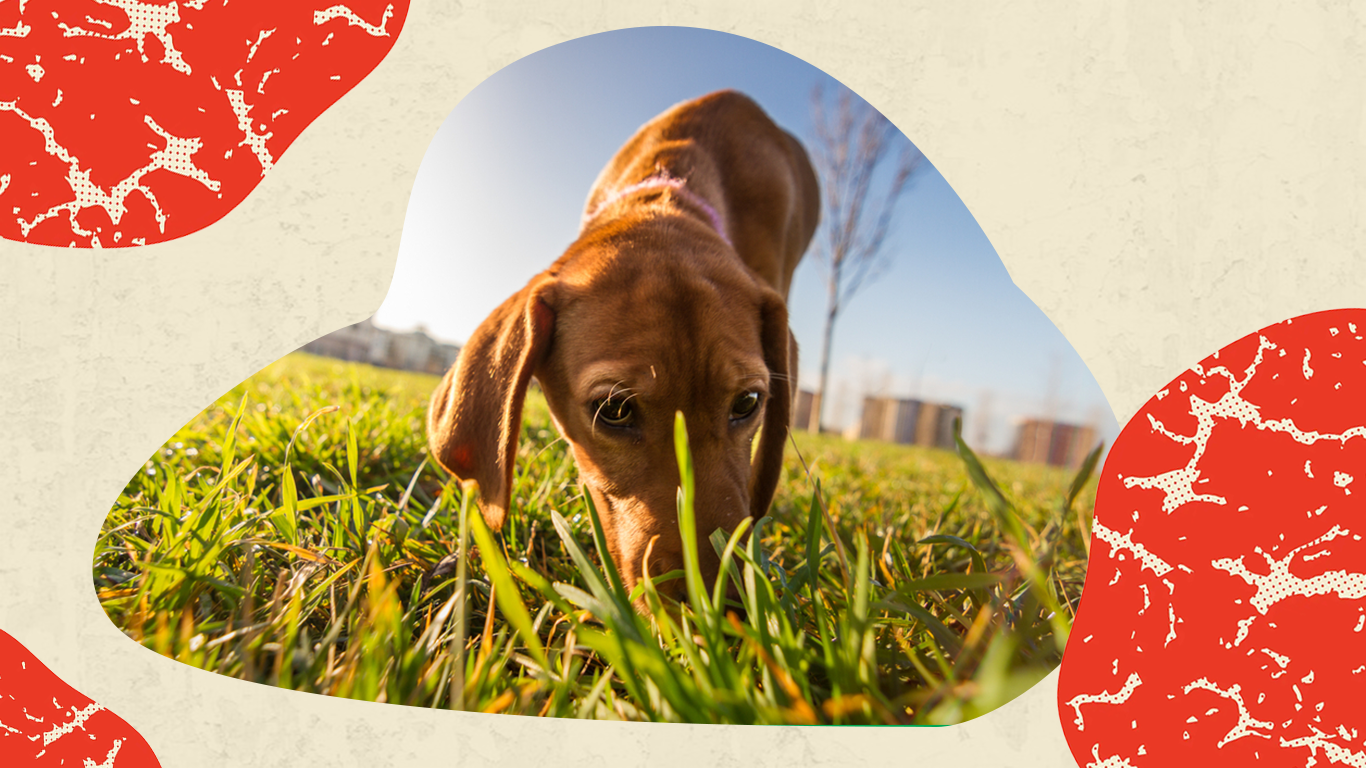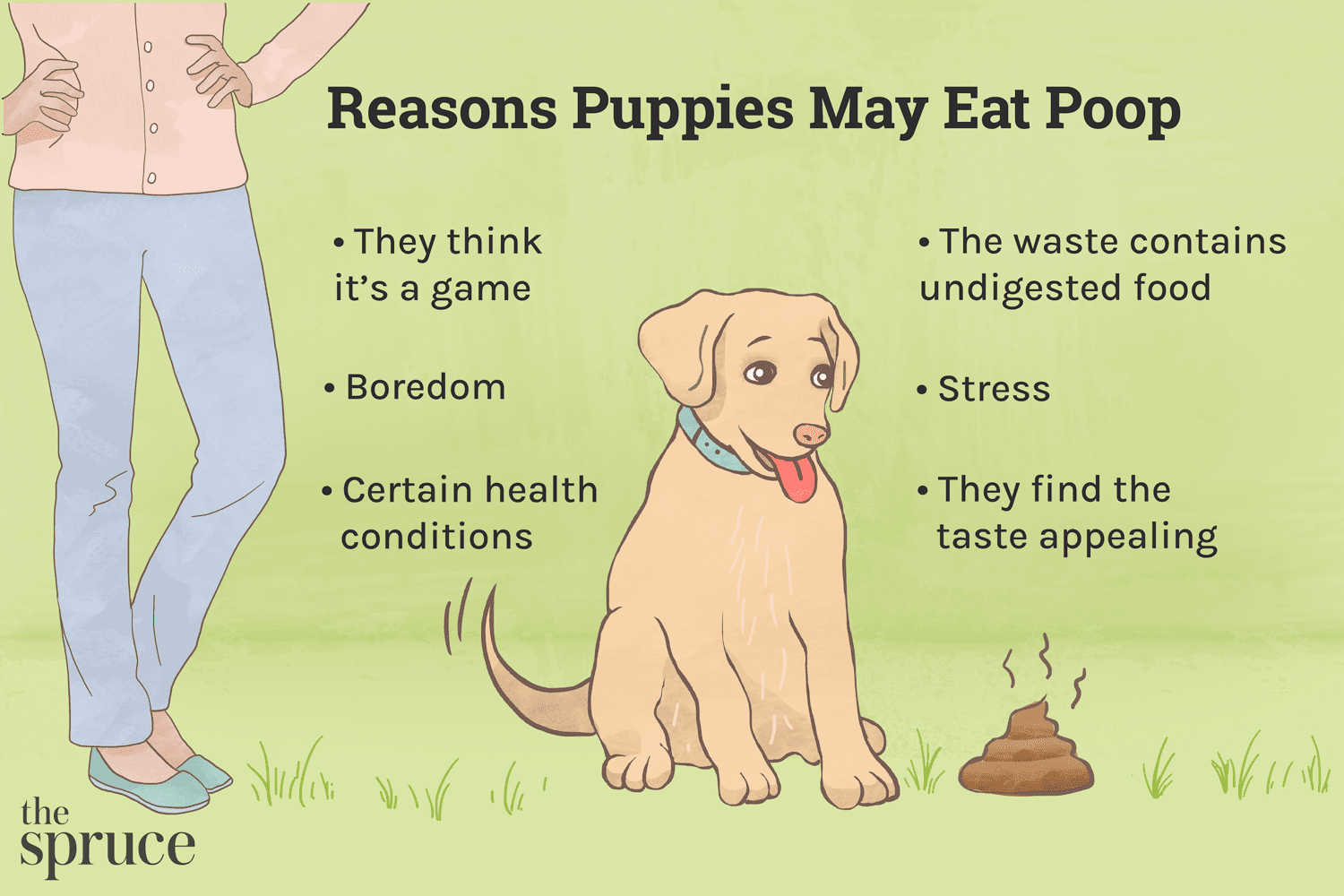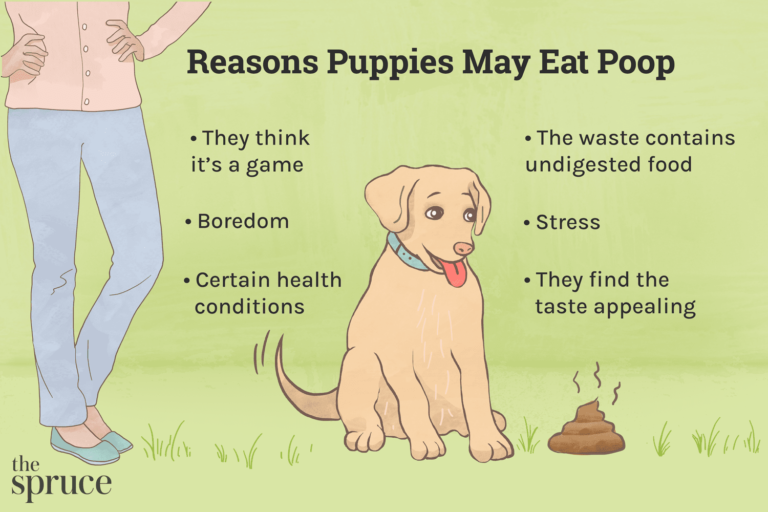To stop dogs from eating their poop, try adding pineapple or pumpkin to their meals. These home remedies can make their stool less appealing.
Dogs may eat their poop due to nutritional deficiencies, stress, or behavior issues. It’s crucial to address any underlying health concerns and provide enough mental and physical stimulation for your pet. Additionally, training and management techniques, such as redirecting their attention and keeping the yard clean, can also help stop this behavior.
Proper vet consultation is always recommended to rule out any medical conditions causing coprophagia. By using a combination of these methods, you can effectively discourage your dog from eating their feces and improve their overall well-being.

Credit: petcarecorner.com
Understanding Coprophagia
Curious about why your dog eats its poop? Discover effective home remedies to stop coprophagia and keep your furry friend healthy and happy.
Understanding Coprophagia Coprophagia is a behavior where dogs eat their feces. It may sound disgusting to us humans, but it is quite common among dogs. This behavior can leave owners perplexed and concerned about their furry friend’s health. In this section, we will explore what coprophagia is and why dogs engage in this behavior. So, let’s dive in!
What Is Coprophagia?
Coprophagia, in simple terms, is the act of dogs eating their poop. While it may seem repulsive to us, it is important to understand that this behavior is natural for dogs. It is believed that coprophagia has primal origins, stemming from their ancestors’ need to hide their scent from predators. However, in domesticated dogs, this behavior can be an indication of an underlying issue.
Why Do Dogs Eat Their Poop?
There are several reasons why dogs engage in coprophagia. Understanding these reasons can help us address the issue and find solutions. Here are a few common reasons:
1. Nutritional Deficiency: Some dogs may eat their poop due to a lack of essential nutrients in their diet. They instinctively try to compensate by eating their feces in the hope of acquiring those missing nutrients.
2. Attention-Seeking Behavior: Dogs are intelligent creatures who crave attention. In some cases, dogs may eat their poop to gain attention from their owners, even if it is negative attention.
3. Anxiety or Stress: Dogs may engage in coprophagia as a response to anxiety or stress. This behavior can be a coping mechanism for them, providing temporary relief from their emotional turmoil.
4. Boredom or Lack of Stimulation: Dogs need mental and physical stimulation to stay happy and healthy. Without adequate exercise and mental engagement, they may resort to eating their poop out of boredom.
5. Motherly Instinct: In some cases, a mother dog may eat her puppies’ feces to keep the den clean and prevent predators from detecting her young ones. This behavior can be observed in other dogs living in a multi-dog household as well.
Understanding why dogs engage in coprophagia is the first step in finding a solution to stop this behavior. In the following sections, we will explore effective home remedies that can help discourage dogs from eating their poop. So, keep on reading! To sum up, coprophagia is a natural behavior for dogs, but it can indicate an underlying issue.
Reasons range from nutritional deficiencies to seeking attention, anxiety or stress, boredom, or even motherly instincts. By understanding the reasons behind this behavior, we can better tackle the issue and find effective remedies. Now let’s delve into some practical home remedies to stop dogs from eating their poop!

Credit: www.wefeedraw.com
Identifying Potential Causes
Identifying potential causes of dogs eating their poop is essential to effectively address this behavior. By understanding the underlying reasons, you can implement targeted strategies to discourage this habit. Common factors contributing to coprophagia in dogs include dietary deficiencies, behavioral issues, and medical conditions.
Dietary Deficiencies
Dogs may consume their feces if their diet lacks essential nutrients such as vitamins, minerals, or enzymes. Inadequate nutrition can lead to cravings and compulsion to seek out missing elements, which may result in coprophagia.
Behavioral Issues
Various behavioral problems, including boredom, stress, or anxiety, can prompt dogs to engage in coprophagia. Additionally, inadequate training or lack of mental stimulation can contribute to the development of this habit.
Medical Conditions
Underlying medical issues such as malabsorption disorders, pancreatic insufficiency, or parasitic infections may lead to coprophagia in dogs. It is important to rule out any potential health concerns through a thorough veterinary examination.
Implementing Preventive Measures
When it comes to preventing dogs from eating their poop, various measures can be implemented to address this behavior. Incorporating these preventive measures into your dog’s routine can significantly reduce the likelihood of them indulging in this unsanitary habit.
Balanced Diet And Nutrition
A balanced diet is crucial in preventing coprophagia, the act of consuming feces. A diet rich in essential nutrients can help address any underlying nutritional deficiencies that may lead to this behavior. Ensure your dog’s meals consist of high-quality protein, fiber, and essential vitamins and minerals to promote overall health and well-being.
Consistent Exercise And Mental Stimulation
Regular exercise and mental stimulation are essential for a dog’s physical and mental health. Providing ample opportunities for exercise and engaging activities can help reduce stress and boredom, which are common triggers for coprophagia. Incorporating interactive toys, puzzle feeders, and obedience training can keep your dog mentally stimulated and less likely to engage in this behavior.
Positive Reinforcement Training
Positive reinforcement is an effective training method to discourage coprophagia. Reward your dog with treats, praise, and affection when they display appropriate behavior, such as ignoring feces or responding to commands. Consistency and patience are key when using positive reinforcement methods to modify your dog’s behavior.
Monitoring And Management
Regular monitoring of your dog’s behavior and environment is crucial in addressing coprophagia. Keep outdoor spaces clean and promptly remove feces to minimize the opportunity for consumption. Additionally, supervising your dog during potty breaks and providing immediate redirection or positive reinforcement can help manage and discourage this behavior.
Exploring Home Remedies
When it comes to stopping dogs from eating their poop, there are several home remedies that you can try. These remedies are not only cost-effective but also safe for your furry companion. In this section, we will explore some effective home remedies that have been proven to help solve this unpleasant behavior.
Adding Supplements To The Diet
Adding supplements to your dog’s diet can be a simple yet effective way to discourage them from eating their poop. Certain supplements, such as digestive enzymes and probiotics, can help improve your dog’s overall digestion and gut health, making their poop less enticing.
Moreover, supplements like yucca extract or parsley flakes can enhance the taste and odor of your dog’s poop, making it less appealing to them. These supplements can be easily incorporated into their regular meals, ensuring they get the extra health benefits while deterring them from indulging in their waste.
Feeding Pineapple Or Pumpkin
Pineapple and pumpkin are two natural remedies that can play a role in discouraging dogs from eating their poop. Both pineapple and pumpkin have properties that can make your dog’s poop taste unpleasant to them.
You can add a small amount of canned, unsweetened pineapple or pumpkin to your dog’s regular food. The enzymes in pineapple and the fiber in pumpkin can make their poop less appealing, as well as aid in digestion and regulate bowel movements.
Using Deterrent Sprays
Deterrent sprays can be a helpful tool when it comes to preventing dogs from eating their poop. These sprays are designed to give your dog’s poop a bitter taste, effectively deterring them from consuming it.
To use deterrent sprays, simply spray a small amount onto your dog’s feces immediately after they have been eliminated. The bitter taste will discourage them from eating it. However, make sure to choose a spray that is specifically formulated for dogs and does not contain any harmful chemicals.
Trying Taste Aversion Techniques
Taste aversion techniques involve modifying the taste of your dog’s poop to make it unappetizing. One technique is to add a small amount of substances with strong flavors, such as hot sauce or apple cider vinegar, to your dog’s food.
When your dog eliminates, they will associate the unpleasant taste of their poop with the added substance. Over time, this association can help break the habit of eating their waste. However, it’s crucial to consult with your veterinarian before using any taste aversion techniques to ensure they are safe for your dog.
By exploring these home remedies, you can find a solution that works for your dog and helps them overcome the behavior of eating their poop. Remember, consistency and patience are key when implementing any remedy, so be sure to stick with it for the best results.

When To Seek Professional Help
Discover when it’s time to seek professional help for stopping dogs from eating their poop with effective home remedies. Protect your furry friend’s health and seek expert guidance to address this behavior.
Persistent Or Worsening Behavior
If your dog’s coprophagia (poop-eating) behavior persists for an extended period or becomes increasingly worse, seeking professional help is crucial. While it’s common for puppies to engage in this behavior, it typically diminishes as they grow older. However, if your adult dog continues to eat their own or other animal’s poop, it may indicate an underlying issue that requires professional intervention. A veterinary behaviorist or professional dog trainer can assess the situation and guide how to address and modify this behavior effectively.
Concerns About Underlying Health Issues
If you suspect that your dog’s coprophagia is related to an underlying health issue, it’s important to consult a veterinarian. Certain medical conditions, such as malabsorption disorders, pancreatic insufficiency, or parasites, can trigger coprophagia. By examining your dog’s health history, conducting diagnostic tests, and performing a thorough physical examination, a veterinarian can determine if any health issues contribute to your dog’s coprophagia. Treating the underlying condition is crucial in resolving the problem.
Lack Of Success With Home Remedies
While there are several home remedies available to deter dogs from eating their poop, some dogs may not respond to them. If you have diligently tried various home remedies and seen no improvement in your dog’s coprophagia behavior, it may be time to seek help from a professional. A professional will not only evaluate your dog’s behavior but also recommend alternative methods or treatments that are tailored to your specific situation. With their expertise, they can devise a personalized plan to address the issue effectively.
If your dog’s coprophagia persists or worsens despite your best efforts, or if you suspect an underlying health issue, it’s important to seek professional help. A veterinary behaviorist or professional dog trainer can provide guidance, assess any underlying health concerns, and recommend appropriate strategies to address and resolve this behavior. Don’t hesitate to reach out for assistance—your dog’s well-being is worth it.
FAQ For How To Stop Dogs From Eating Their Poop Home Remedy
How Do I Stop My Dog From Eating Their Poop?
To stop your dog from eating their poop, you can try a few different approaches. First, make sure your dog is on a balanced and nutritious diet to address any potential nutritional deficiencies. Second, keep the dog’s living area clean and remove any feces immediately.
Third, discourage the behavior by using positive reinforcement training and teaching the “leave it” command. Lastly, consult with a veterinarian for further guidance.
Are There Any Home Remedies To Prevent Dogs From Eating Their Poop?
Yes, there are some home remedies you can try to prevent dogs from eating their poop. Adding certain foods like pineapple, pumpkin, or meat tenderizer to their diet can make their poop taste unappealing. You can also sprinkle some additives like hot sauce or bitter apple spray on their feces to discourage them from eating it.
However, it’s important to consult with a veterinarian before trying any home remedies.
Is Coprophagia In Dogs A Sign Of A Health Issue?
Coprophagia in dogs can have various causes, including behavioral, nutritional, or medical issues. While occasional poop-eating may not be a concern, persistent coprophagia may indicate an underlying health problem. It’s recommended to consult with a veterinarian to rule out any nutritional deficiencies, parasites, gastrointestinal issues, or other medical conditions that might be causing the behavior.
The veterinarian can provide guidance and develop an appropriate treatment plan if needed.
Conclusion
To effectively stop dogs from eating their poop, it’s essential to implement reliable home remedies. By understanding the root causes of this behavior and using techniques such as a balanced diet, keeping the environment clean, and supervised potty breaks, you can discourage your furry friend from engaging in this unappetizing habit.
Remember, consistency, patience, and positive reinforcement are key in successfully tackling this issue. With these practical strategies, you’ll be well on your way to helping your dog break this unpleasant habit.



